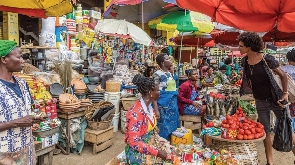Ghanaian enterprises seeking to exploit duty free access to consumer and business to business markets across the continent are eagerly awaiting full access to the new African Union online portal known as the African Trade Observatory.
The development of the impending new portal, which is now at its pilot stage, is supported by the European Union and the International Trade Centre, and is billed to play a crucial role in the implementation of the African Continental Free Trade Area (AfCFTA)
The new online tool, designed to help businessmen and businesswomen in Africa understand how best to trade between African countries came a step closer to becoming fully operational in August 2020, as a demonstration version came onstream.
Ghanaian trade regulators and a few captains of commerce who have seen the demonstration since then claim to be very enthusiastic as to its capacity to provide them with crucial information.
The African Trade Observatory (ATO) has since begun testing the online dashboard to give real-time trade statistics to African users.
Such information will include intra-continental trade flows (traded values, traded quantities, the use of tariff preferences, taxes and fees paid at the border), and information on market conditions (such as taxes applicable at the border and regulatory requirements).
The transfer of raw data from providers to the ATO team will be automated where possible to make the collection of quantitative information sustainable.
The portal will be divided into three modules to allow users to:
*Compare trade opportunities in Africa
*Explore market access conditions of African partners
*Monitor the implementation process and achievements of the AfCFTA and the Boosting Intra African Trade Action Plan.
Members of the ATO Steering Committee were presented with a beta version of the Compare and Explore modules oin August 2020. These two pillars of the ATO Dashboard have been designed to support micro, small and medium enterprises in Africa to simplify their market research.
A first set of live demonstrations were organized in September and highlighted how users can compare challenges and opportunities of the African markets, and explore market access conditions and business partners to expand their business within the continent.
As the hosts of the headquarters of AfCFTA, Ghanaian stakeholders have been given extensive access to the workings of the ATO and consequently the private sector is now preparing strategies for how best to make use of the information in will provide on a regular basis when it becomes fully operational.
The ATO Steering Committee includes representatives of the African Union Commission, the European Union, ITC, the United Nations Economic Commission for Africa (UNECA), and Regional Economic Communities (RECs).
Ms. Dorothy Tembo, ITC’s Executive Director, asserts that timely trade data could positively impact policy and empower businesses. She says that the ATO will be an essential tool in AfCFTA implementation adding that RECs’ presence on the Steering Committee portrayed a united front supporting African regional economic integration.
Mr. Thomas Huyghebaert, the EU Head of Cooperation in Addis Ababa, has assured that: “The EU is committed to supporting the AU in its integration agenda, and ATO is one of the projects that it is supporting, which is a key operational tool to the AfCFTA.”
The EU has pledged an additional €5 million to the ATO project to expand its scope by including additional modules on services, investment, and rules of origin. He noted that the AfCFTA is an essential pillar for the cooperation between the African Union and the European Union.
Mr. Chiza Charles Chiumya, the AU Commission’s Acting Head of Trade, enthuses that: “One of the reasons for the low level of intra-African trade is the absence of trade information and market opportunities. The provision of market information and opportunities in Africa will be the main pillar of the ATO. Real-time data on trade flows is the new crude oil, especially now when the implementation of the AfCFTA is the beacon of hope towards the Post-COVID recovery strategy for Africa.”
The Steering Committee has agreed to meet regularly to review progress on this important and ambitious project. The next meeting is scheduled for March 2021.
Business News of Wednesday, 21 October 2020
Source: goldstreetbusiness.com
Ghanaian traders await African Trade Observatory access
Entertainment












